Internet Access for All: The UK Plan to Close the Digital Divide
Digital prosperity is spreading across the globe, but unless governments step in, millions will be left out. Here's how Britain can close the gap.
Having emerged from the academy just a few years ago, the Internet has rapidly blossomed into the most profoundly influential force of our era. Its social and economic importance has been likened to that of the Industrial Revolution. There is now a widely shared vision of universality -- an expectation that every individual and organization will have online access to a vast array of information and services in the not-too-distant future. At the most recent World Economic Forum in Davos, Michael S. Dell, founder of the Dell Computer Corporation, asserted that the Internet eventually will be as ubiquitous and as normal as electricity is today.
We, too, believe that the universality of the Internet is inevitable. However, every country will take its own distinctive path toward that goal, a path that will have a far-reaching impact on national productivity, the development of civic society, and the prosperity and lifestyles of individual citizens.
While Internet growth in developed nations should and will be led by private enterprise and individual behavior, it is becoming clear that a "digital divide" threatens to create an Internet underclass. Governments around the world are concerned that unequal connectivity to the Internet could widen social and economic divisions -- among individuals, within companies, even among nations. Although commercial providers of computer equipment and Internet connectivity are cutting prices, and introducing products and services to address underserved user groups, the distribution of Internet access will likely remain uneven. Unless governments step in to even out the growth rate and the reach of Internet access across all of society, the digital divide will only worsen.
At the same time, governments have an imperative to lower the cost and improve the quality of the public services they deliver, and online technologies will facilitate that improvement. But if a significant portion of the population remains offline, governments will have to run parallel structures, adding to cost and complexity, and reducing the potential savings from e-government. Because many of the citizens most in need of government services are likely to be lowest on the commercial sector's priority list, there is clearly additional value in using government initiatives to accelerate a nation's Internet adoption rate.
As a major force in the marketplace, governments can drive universal access and usage. If governments, for example, were to move all of their supplier relationships online, it would enable (and in some cases oblige) many companies to follow suit. Similarly, if governments were to provide a cash incentive to encourage citizens to submit their tax returns online (as the U.K. and U.S. governments have done), it would encourage use by individuals. At a more basic level, governments, like large organizations, are major employers: The access and Internet training provided to their work forces has a significant impact on the broader marketplace.
Case in point: the United Kingdom. Although the U.K. has a high level of Internet penetration and was Europe's largest e-commerce market in 1999, an emerging digital divide threatens to leave 20 million people excluded from the knowledge economy in three years' time. That is why the U.K. government took the lead in driving toward a goal of Internet access for every citizen in the United Kingdom. In March, Prime Minister Tony Blair made universal access an official goal to be reached by 2005. The alternative would be to settle for a widening gap between the connected and the unconnected, a gulf with severe economic, educational, and social implications. Although the falling costs of personal computers and Internet access will help to increase penetration rates, vibrant market forces are not sufficient to ensure universal access to the online world.
Digital Plenty
Many of the world's developed economies are enjoying their longest-ever period of uninterrupted non-inflationary growth. Commentators attribute much of this success to the long-heralded power of information and communications technology harnessed to capture productivity gains and build new global markets.
The companies supplying the technology have themselves become drivers of economic growth. Between 1995 and 1998, these high-tech industries accounted for 8 percent of U.S. GDP, and contributed, on average, 35 percent of the nation's real economic growth. By 2006, almost half of the American work force will be employed by industries that are either major producers or intensive users of high-tech products and services.
In turn, business itself is undergoing a competitive revolution. Because of the Internet, small- and medium-sized businesses can now define their marketplaces as global. New business models based on virtual shop fronts, and hybrids of "bricks-and-clicks," are improving choice and convenience for customers. The fundamental economics are changing, and transaction costs are tumbling. It is estimated that U.S. businesses will save about $600 billion from Internet-enabled reengineering by 2002.
Equally intriguing, however, and perhaps even more visible to the average man and woman, will be the revolution in the interplay between government and citizen. Here, the transformation is only just beginning. Starting this year, U.K. citizens can file their tax returns electronically, and in doing so save £10 (U.S.$16). In the U.S., nearly 30 million taxpayers filed electronically in 1999, or close to one in four of the total returns received by the Internal Revenue Service. The 2.5 million U.S. businesses that filed e-returns in 1999 accounted for 84 percent of all business tax revenue. The Singapore government estimates that its similar scheme saves approximately U.S.$35 million per year in administration costs. Through the online delivery of public services, consumers and citizens can benefit from convenience and, in many cases, speed. Since 1998, over 90,000 Singaporean students have applied for higher education online. Meanwhile, Australian job seekers can choose from almost 3,000 jobs a day that private employers place in a government-initiated jobs database.
With such far-reaching impact on government and consumers alike, administrations all over the world are defining their roles in creating the right environment for rapid but balanced knowledge-based economic growth. Best practices for the knowledge economy apply to both "hard" and "soft" infrastructures; hard infrastructure includes, for example, communications networks, while key elements of soft infrastructure include education, cyberlaws, and the ability of government institutions to lead by example. Governments around the world are making differing rates of progress in each. (See Exhibit 1, below.)
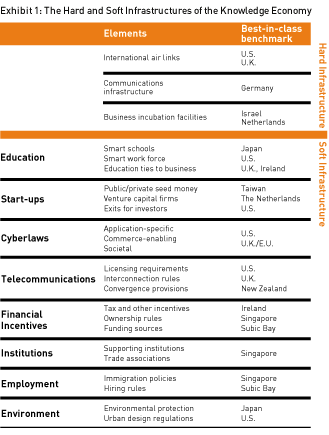
The U.K.'s Divide
For all the prosperity in emerging digital economies, it is clear that even advanced countries are experiencing difficult transitional problems. The Singapore government is addressing a chronic shortage of workers with the right IT skills. Australia faces a problem in connecting its remote rural communities. The U.S. government has for some years now been assiduously monitoring its digital divide among ethnic, socioeconomic, and gender groups.
Like the U.S., the U.K. is experiencing skill shortages and the unbalanced distribution of the benefits of new information technologies. In many respects, however, it is well positioned. British Internet users are Europe's "power users," spending on average more time online than their counterparts in Germany, Scandinavia, and elsewhere. With recent announcements of flat-rate, unmetered access from several providers, which is supplanting the restrictive payment-per-time-unit schemes, the number of power users will rise. In addition, the proportion of companies that are connected is greater in the U.K. than in any other European country.
But Britain is not leading in Internet penetration. According to our study of Internet usage habits, six out of 10 people in the U.S. regularly access the Internet from work, home, or a public access terminal. In Scandinavia, about 40 percent do so. A noticeable gap currently exists between the world's most connected nations and a second tier of nations, which the U.K. leads, with penetration levels in the range of 15 percent to 25 percent. (See Exhibit 2, below.)
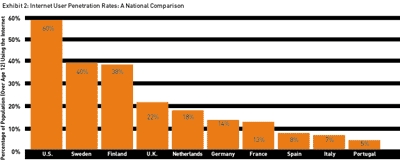
More importantly, almost half of 15- to 24-year-olds, accounting for 15 percent of the U.K. population, are regular users, but among the fifth of the U.K. population over the age of 64, just one person in 25 is online. When one measures by social class, education level, employment status, or employer size, alarming disparities are apparent.
Of even greater concern, however, is that as the online revolution runs its course, the divide looks set to grow worse. New users are currently joining the U.K.'s online population at the rate of 4 million (or 8 percent of the population) each year, and the growth rate likely will be sustained over the coming years. Powerful service propositions such as free e-mail accounts are driving the current expansion of the market. Low-cost access terminals, such as TV set-top boxes and Web phones, are emerging, and digital interactive TV will add new Internet users, as powerful corporate players such as British Sky Broadcasting Group PLC (BSkyB) and OnDigital PLC expand their offerings. Wireless Internet access also will usher in new users and applications starting later this year. New telecommunications services will enable "always-on" connectivity at affordable prices. With these market forces, the penetration rate in the U.K. should pass 60 percent "naturally," possibly as soon as 2003.
However, far from bridging the emerging inequality, the wave of growth is likely to exacerbate it, leaving a group of over 20 million citizens excluded from the fruits of the knowledge economy. (See Exhibit 3, below.)
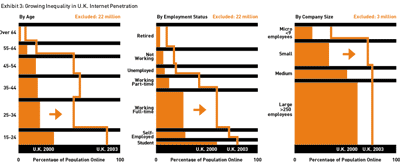
Some jobs, roles, or lifestyles do not need to and never will embrace the Internet. Downloading music from Web sites or joining chat groups to discuss the latest snowboard design is not for everyone. There is clearly no case for pushing uninterested citizens toward something they neither want nor need. Nonetheless, the issue of exclusion is problematic, because the online revolution will affect all members of society:
- Employers are beginning to see Internet skills as a key qualifier when selecting candidates for interviews, and even — at the aggregate level — when deciding where to locate new facilities.
- Companies under pressure to reduce costs in the face of competition from dot-coms will move customer-service functions online (although some customers have yet to master the automated voice response systems on telephone hotlines).
- In education, homework assignments are likely to move increasingly to the Internet. Students with access to Web skills and a home PC will have major advantages over those who do not.
- Government services from tax payments to job placements will increasingly be offered online.
As the marketplace stimulates opportunity, these conditions suggest government must step forward to ensure that opportunities are evenly distributed. That is why we believe government should take the lead in ensuring Internet access to every citizen, or face a widening gap between the well-to-do and the underserved in income, opportunity, and access to government services.
Government's Decisive Role
In countries with high Internet-usage rates and a more mature high-tech sector, governments are active in developing policy and fostering activity in this field. Indeed, each of the world's leading online nations is characterized by a government that has not been content simply to leave the emergence of a knowledge economy to market forces.
Consider the United States, the world's leading online economy. It has the highest absolute number and percentage of people online; the most intensive users, measured in terms of both the hours and the dollars they spend online; and three-quarters of the world's e-commerce. While the vibrant U.S. private sector garners headlines, the profound role of the U.S. government is often overlooked.
As far back as 1994, the Clinton administration committed to connecting every classroom, library, community center, clinic, and hospital to a national "information superhighway" by 2000. Vice President Al Gore's early appointment as "E-minister" also signalled the Clinton administration's dedication to playing an active role in fostering the expansion of the Internet. This was the first government to officially identify the problem of a digital divide, and it has actively measured and addressed it since 1996.
The U.S. federal government spends $5.5 billion per year on projects facilitating the knowledge economy, ranging from wiring schools and libraries, to developing technologies that will broaden penetration. With the construction of the information superhighway well under way, President Clinton in a recent speech committed "to make connection to the Internet as common as connection to the telephone is today."
Governments of other leading online nations have set similar goals. Singapore's government has committed to offer "most public services over the Internet by 2001," and Finland has pledged to offer all government services online by 2001. The Finns have further committed to ensure that every citizen has an e-mail address by 2004, and to reduce government administration costs by one-third by 2002, through the use of IT and networks.
Australia has one of the most socially inclusive Internet user populations, thanks to a high level of government commitment, led by two dedicated bodies: the Office for Government Online, responsible for delivering government services online; and the National Office for the Information Economy, which coordinates broad knowledge economy policy. Japan, which is Asia's biggest e-commerce market, has a similar cross-governmental body, chaired by the prime minister.
The U.K. government has a well-defined "Information Age Strategy," with the goal of universal Internet access by 2005 the latest in a series of initiatives. The E-commerce@its.best.uk report launched by the prime minister last September included 60 commitments to further the growth of e-commerce in the U.K. The government has established targets for electronic delivery of government services (rising to 100 percent by 2008) and online government procurement, and it has appointed an e-minister and an e-envoy to provide cross-departmental leadership for these policies.
Government's policies on regulation and competition play an important role in creating the foundations for universal access in the U.K.; the 1999 Electronic Communications Bill's provisions on digital signatures and the auction of five broadband mobile communications licenses are excellent examples, as are moves to liberalize the "last mile" of communications network.
Other significant measures include a £1.7 billion (U.S. $2.7 billion) package to build Internet skills, involving IT training courses, public Internet access points, tax exemptions on loans of computers to employees, and the provision of 100,000 free computers to low-income communities. These policy initiatives supplement the market-led trend toward higher Internet penetration and usage, and put the issue of access firmly on the policy agenda.
Bridging the Divide
A common set of issues for government are of particular concern to countries with a high level of Internet use:
- When will adoption in the population reach universal levels?
- Can government ensure that the online wave is socially inclusive?
- Do individuals possess the necessary IT skills?
- Can small businesses keep pace?
- How can government foster a thriving home market for the goods and services of the knowledge economy?
- How should government take the lead?
These are merely the starting questions that proactive governments must ask as they formulate policy; bolder steps will be needed to ensure that the gap between information haves and have-nots does not grow wider. Policy development needs to build on initiatives already in place, and harness the powerful changes under way in the business and non-profit sectors of society.
We recommended that the U.K. government make a clear commitment to universal Internet access — from the home, school, workplace, or convenient public access point — and advance measures to promote that goal as other governments have begun to do. But access for everyone is not enough. To capture fully the benefits of the knowledge economy, users need more than availability and must move beyond passive browsing. They should become active users — participating in discussions, educating themselves, making transactions, and engaging
in commerce. At the next level, the Internet offers unprecedented opportunity for individuals to become entrepreneurs themselves — setting up Web sites and
ultimately e-businesses. Government can play a role not only in getting people online, but also in creating conditions and incentives for individuals to evolve into active users — even power users — and businesses to become power players. (See Exhibit 4, below.)
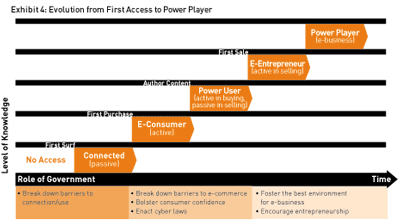
Beyond this, achieving equal access — and equal economic opportunity — requires measures aimed at those sections of the population otherwise left behind: the elderly, the economically inactive, the unskilled, and, to a lesser extent, those working in very small companies. Measures should address the principal barriers that are holding back penetration in these segments today: affordability of access, literacy and comfort with the technology, and the perception that the Internet offers little value to many individuals.
Because individuals primarily access the Internet with a PC and a modem, the cost of this equipment and the ongoing telecommunications and subscription payments are a clear barrier to access. (See Exhibit 5.)
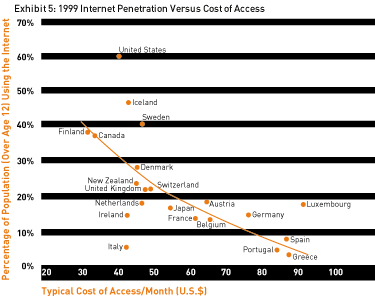
Prices are falling fast, however, which encourages use. Promotional offers — such as free PCs in return for an online subscription — abound. Flat-rate charging for telecommunications access will become more prevalent in households and small businesses when networks have been upgraded to allow the same cost-efficient technology (packet-switching) that is common in large companies today. In general, existing policies in the U.K. create the right market dynamics to support an increasingly affordable Internet.
Literacy and comfort with the Internet and computers in general are more complex issues. There is a broad consensus that schools play a pivotal role, but this ignores adult education and all those outside the educational system. It also requires a significant reorientation of teaching practices. Commercial interests are developing more user-friendly software to alleviate the initial difficulty of going online; indeed, one European science ministry is diverting the majority of its funding into sponsoring development of such applications. An additional issue is parents' concerns about the content accessible by their children. But here, too, commercial sector measures to promote "walled gardens" of safe content are advancing steadily.
In the case of creating compelling applications and content, government can lead by example, because it provides many services well-suited to the online world. Moving core government services such as job placement, medical care, and benefits administration to the Internet will in itself encourage use across the population. This may be the single largest step a government can take.
In developing online provision of its services, government — through partnership with private enterprise — can develop skills and assets in the commercial sector. This will create opportunities to promote entepreneurship so that innovative new applications are launched quickly and successfully. There are key strategic choices in developing e-government: in particular, how it manages links across agencies and services, and with the private sector, and also whether and how to create a single portal for citizens' convenience.
In addressing all these challenges, government has four levers at its disposal:
1. Creating policy (e.g., incentives, regulations) to enable the hard and soft infrastructures that will encourage Internet penetration and usage.
2. Designing and delivering government services online.
3. Rethinking the use of government assets and infrastructure: Job centers, schools, post offices, or even municipal council buildings could become Internet access and training centers.
4. Recognizing government influence as a major purchaser and employer through moving to online procurement and providing access and skills to public-sector employees.
In pursuing this agenda, the government should co-opt those private-sector bodies — regional and international — with the biggest stake in the broad development of the knowledge economy. A combined effort will harness the dynamism in the commercial marketplace and open up new markets at an earlier stage. This will also allow enterprises to take advantage of new business opportunities. As a result, the private sector should have a genuine interest in supporting the government's policy objectives — the more so because by concentrating on underserved population segments, the government will complement private-sector activity. Working in partnership with businesses will similarly allay any fears that the government is meddling in a key sector of the knowledge economy, and will free up expertise and resources to cover this complex and fast-moving area of activity. An economy in which consumers and companies feel fully able to exploit the potential of the new technology — a society in which organizations and individual citizens can access and share information and services freely — is the end game for the knowledge economy. ![]()
Reprint No. 00207
| Authors
Barrie Berg, berg_barrie@bah.com Barrie Berg is a is a vice president with Booz Allen Hamilton based in New York. Ms. Berg has 15 years of experience in the U.S., Europe, and Latin America helping consumer and retail companies develop growth strategies and strengthen marketing and sales organizations. Mark Page, page_mark@bah.com Mark Page is a vice president with Booz Allen Hamilton in London. He specializes in the wireless sector and works with clients across Europe on 3G issues. Mark Melford, melford_mark@bah.com Mark Melford is a senior associate with Booz-Allen & Hamilton’s Communications, Media, and Technology Group. He specializes in projects at the intersection of the information and communications technology sectors. |



